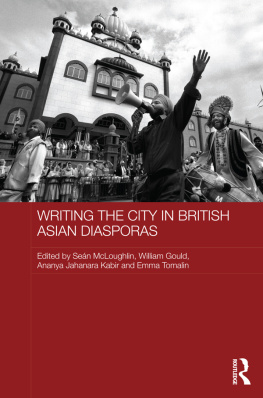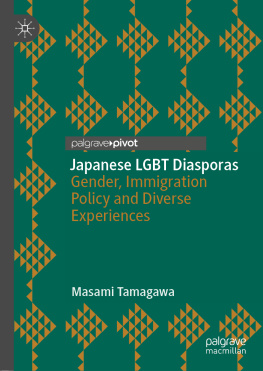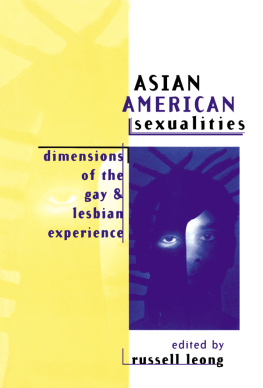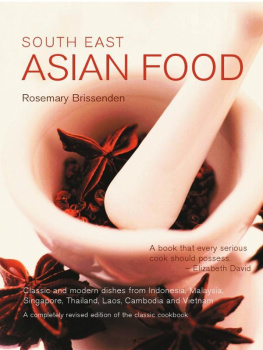Britains cities have been indelibly shaped through centuries of migration and settlement. In this wonderfully evocative and richly textured book, the authors trace the historical and contemporary inscriptions of five iconic British Asian citiesBirmingham, Bradford, Leicester, London and Manchester. Exploring multiple ways and scales of writing the city, these essays remind us that all cities are global cities, woven from diasporic and local (hi)stories, journeys and the imagination of home.
Claire Alexander, Professor of Sociology, University of Manchester
How have British cities been transformed by the settlement of Asian immigrants and in what ways did these cities crucially shape newcomers lives? Like a kaleidoscope refracting alternative patterns, the answer to this question lies, this marvellous collaborative volume shows, in the multiple voices writing the Asian diasporas urban experienceanthropologists, sociologists, poets, novelists, oral and cultural historians, politicians, policymakers and journalists. Avoiding sweeping, essentialist generalisations, the books comparative scholarship and fine attention to detail demonstrate the depth and subtlety with which the Asian diaspora in Britain has been researched and analysed. Recommended reading for anyone teaching on migration and diaspora, and a must for new researchers on the Asian diaspora.
Pnina Werbner, Professor Emerita of Social Anthropology, Keele University
Writing the City in British Asian Diasporas
In 1962, the Commonwealth Immigrants Act hastened the process of South Asian migration to postcolonial Britain. Half a decade later, now is an opportune moment to revisit the accumulated writing about the diasporas formed through subsequent settlement, and to probe the ways in which the South Asian diaspora can be re-conceptualised.
Writing the City in British Asian Diasporas takes a fresh look at such matters and will have multi-disciplinary resonance worldwide. The meaning and importance of local, multi-local and trans-local dynamics is explored through a devolved and regionally-accented comparison of five British Asian cities: Bradford, the East End of London, Manchester, Leicester and Birmingham. Analysing the writing of these differently configured cities since the 1960s, its main focus is the significant discrepancies in representation between differently-positioned texts reflecting both dominant institutional discourses and everyday lived experiences of a locality. examines how the arts and humanities fields of History, Religion, Gender and Literary/Cultural Studies have all written British Asian diasporas, and how their perspectives might complement the better-established agendas of the social sciences.
Providing an innovative analysis of South Asian communities and their multi-local identities in Britain today, this interdisciplinary book will be of interest to scholars of South Asian Studies, Migration, Ethnic and Diaspora Studies, as well as Sociology, Anthropology, and Geography.
Sen McLoughlin is Senior Lecturer in Religions and Diasporas in the School of Philosophy, Religion and the History of Science, University of Leeds, UK. He is co-editor of European Muslims and the Secular State (2005) and Diasporas: Concepts, Intersections, Identities (2010).
William Gould is Professor of Indian History in the School of History, University of Leeds, UK. He is the author of Hindu Nationalism and the Language of Politics in Late Colonial India (2004); Bureaucracy, Community and Influence in India: Society and the State 1930s1960s (2011) and Religion and Conflict in Modern South Asia (2012).
Ananya Jahanara Kabir is Professor of English Literature at Kings College London having previously lectured at the University of Leeds, UK. Her publications include Territory of Desire: Representing the Valley of Kashmir (2009) and Partitions Post-Amnesias: 1947, 1971 and Modern South Asia (2013).
Emma Tomalin is Senior Lecturer in Religious Studies in the School of Philosophy, Religion and the History of Science, University of Leeds, UK. She is co-editor/author of books including Biodivinity and Biodiversity: The Limits to Religious Environmentalism (2009); Dowry: Bridging the Gap between Theory and Practice (2009) and Religions and Development (2013).
Routledge Contemporary South Asia Series
Pakistan
Social and cultural transformations in a Muslim nation
Mohammad A. Qadeer
Labor, Democratization and Development in India and Pakistan
Christopher Candland
ChinaIndia Relations
Contemporary dynamics
Amardeep Athwal
Madrasas in South Asia
Teaching terror?
Jamal Malik
Labor, Globalization and the State
Workers, women and migrants confront neoliberalism
Edited by Debdas Banerjee and Michael Goldfield
Indian Literature and Popular Cinema
Recasting classics
Edited by Heidi R.M. Pauwels
Islamist Militancy in Bangladesh
A complex web
Ali Riaz
Regionalism in South Asia
Negotiating cooperation, institutional structures
Kishore C. Dash
Federalism, Nationalism and Development
India and the Punjab economy
Pritam Singh
Human Development and Social Power
Perspectives from South Asia
Ananya Mukherjee Reed
The South Asian Diaspora
Transnational networks and changing identities
Edited by Rajesh Rai and Peter Reeves
PakistanJapan Relations
Continuity and change in economic relations and security interests
Ahmad Rashid Malik
Himalayan Frontiers of India
Historical, geo-political and strategic perspectives
K. Warikoo
Indias Open-Economy Policy
Globalism, rivalry, continuity
Jalal Alamgir
The Separatist Conflict in Sri Lanka
Terrorism, ethnicity, political economy
Asoka Bandarage
Indias Energy Security
Edited by Ligia Noronha and Anant Sudarshan
Globalization and the Middle Classes in India
The social and cultural impact of neoliberal reforms
Ruchira Ganguly-Scrase and Timothy J. Scrase
Water Policy Processes in India
Discourses of power and resistance
Vandana Asthana
Minority Governments in India
The puzzle of elusive majorities
Csaba Nikolenyi
The Maoist Insurgency in Nepal Revolution in the
twenty-first century
Edited by Mahendra Lawoti and Anup K. Pahari
Global Capital and Peripheral Labour
The history and political economy of plantation workers in India
K. Ravi Raman
Maoism in India
Reincarnation of ultra-left wing extremism in the twenty-first century
Bidyut Chakrabarty and Rajat Kujur
Economic and Human Development in Contemporary India
Cronyism and fragility
Debdas Banerjee
Culture and the Environment in the Himalaya
Arjun Guneratne
The Rise of Ethnic Politics in Nepal
Democracy in the margins
Susan I. Hangen
The Multiplex in India
A cultural economy of urban leisure
Adrian Athique and Douglas Hill
Tsunami Recovery in Sri Lanka
Ethnic and regional dimensions
Dennis B. McGilvray and Michele R. Gamburd
Development, Democracy and the State
Critiquing the Kerala model of development





